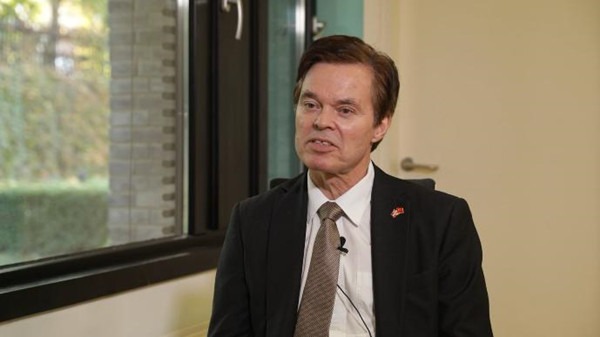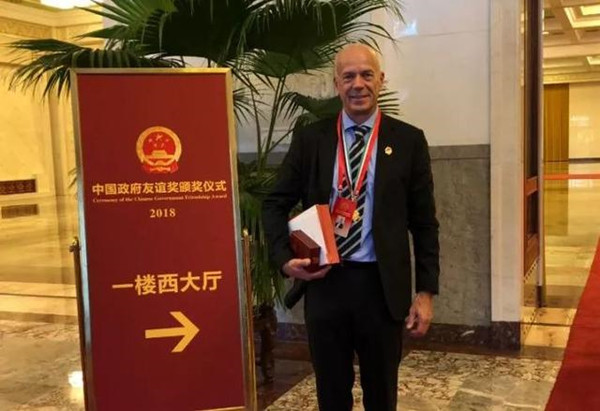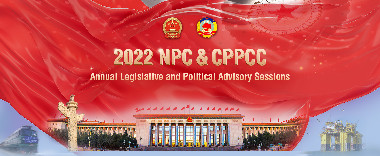Responsible environmental practices a key component of Norway-China BRI cooperation

Mr Knut Sorlie, Commercial Counselor of the Royal Norwegian Embassy in China, recently shared his views with China Daily on Chinese central SOEs and China's overseas economic cooperation. [Photo/chinadaily.com.cn]
Knut Sorlie, commercial counselor of the Royal Norwegian Embassy, was in Doha back in 2001 when China ascended to the WTO and has since spent a significant portion of his career in China. Having witnessed the evolving relationship of the two countries, he has a great deal to say about the relationship moving forward now that the Belt and Road Initiative (BRI) is underway:
"I think it's a very bold idea, it has some challenges of course; but I think it's long term thinking from the Chinese side."
His concerns about sustainable development and environmental consciousness have been echoed by the Norwegian Minister of Trade and Industry, Monica Maeland, who said that "green shipping is one of our main focuses"; and Sturla Henriksen, CEO of the Norwegian Shipowners' Association, who said that the Norwegian shipping industry "is technologically advanced and sustainable".
Chinese State-owned companies are also becoming increasingly aware, as shown by the detailed declarations of environmental impact released by Sinopec, China Minmetals and CNPC.
"Norway has three world class industries, all of them are related to ocean," explains Sorlie. "The newest industry is oil and gas. We have built up a very advanced supply chain of industries related to oil and gas drilling and these are now very dependent on the international markets and these are also dealing with China."
Offering some numerical perspective and highlighting the importance of technology in the relationship, he adds that, "On average, I think all the rigs that are being built in China are 45 percent filled with Norwegian technology. It could be navigation systems, command-control, IT systems, and life boat propellers and different kind of things."
Ninety percent of Northern Hemisphere international trade passes through the strategically important Arctic region, to which Norway is a gatekeeper. The region is also extremely rich in natural resources, accounting for up to 20 percent of the Earth's reserves.
Norway, which looks south to Europe, west to North America, and east to Asia, began talks with China about a free trade agreement bypassing the European Free Trade Association in 2001.

Mr Helge Aasen, Board Director of Bluestar and CEO of Elkem, Norway, won the 2018 "Friendship Award" of the Chinese government. [Photo provided by Bluestar]
Even though talks didn't go as planned in 2001, bilateral relations have now been normalized and collaborative efforts are gaining traction. The first Arctic BRI project was an investment by the $40 billion Silk Road Fund for a 9.9 percent stake in the $27 billion Yamal LNG project, which is a landmark project in terms of transportation, infrastructure, and resource development in the Eurasian Arctic. Financing partly comes from loan agreements worth over $12 billion with the Export-Import Bank of China and the China Development Bank.
Outside the commercial sphere, the two countries also view each other as partners. "There is a growing interest for Mandarin in Norwegian schools," commented Sorlie, who also congratulated Norwegian company Elkam, whose CEO was honored with the China Friendship Award in 2018.
Ties between the two counties are also closer due to burgeoning industries that heavily involve both countries such as tourism and seafood exports to China. The Norway-China seafood export sector is at an all time high and is expected to be worth 10 billion yuan ($1.45 billion) by 2025, according to a forecast by China Daily.
On the topic of Chinese direct investment in Norwegian companies, Knut Sorlie raises an often overlooked point: that innovation in Norway, no matter how promising, is not very scalable; but with collaboration from Chinese companies and access to the Chinese market, this is set to change. Further to that point, he also considers China to be a leader in mobile technology and e-commerce, and considers the exchange of expertise with his home country as a partnership that will pave the way for development in these areas.
Aker Bio Marine recently signed a memorandum of understanding with the China Overseas Development Association (CODA) for the shipping tech firm to expand vessel-building operations to the world's second largest economy. Reciprocating the tech exchange, Norwegian banks like Nordea and DNB are drawing inspiration from Chinese mobile payment processors in their upcoming plans.
Green finance is also high on the agenda, according to Norway's Foreign Minister Borge Brende's statements to numerous press outlets.
It is evident the two nations will face the challenges ahead hand in hand. As China emphasized at the BRI forum in Beijing, win–win and common development is the goal. Expressing a similar view regarding cooperation, Knut Sorlie said "You can partner with China, and we are basically in the same boat, because we are on the same planet."



